- Home
- Newt Gingrich
Understanding Trump Page 7
Understanding Trump Read online
Page 7
In February, after Trump convinced Lockheed Martin to lower its latest bill for ninety F-35 fighter jets by $600 million the month before, he shaved $1 billion off the cost of two new Air Force One planes after one hour of discussions with Boeing.
Because he loves to wheel and deal so much, he has become incredibly good at it. He knows that every yes is preceded by several rejections.
He was turned down at nearly every turn when he first set out to develop Trump Tower.
In The Art of the Deal, Trump describes how when he first approached Bonwit Teller to tell them he wanted to buy the store and building, a man named Franklin Jarman politely told him, “You’ve got to be crazy if you think there’s any way we’d ever sell this incredible site.”
But Trump persisted. He wrote letters month after month to Jarman and was ignored, until he saw that Genesco, the company that owned the building, was in financial trouble and had hired a new chief executive named John Hanigan. Trump called Hanigan, and they met within a half hour. A few weeks later, Trump had a deal signed for the building and the remainder of the land lease for $25 million.
Then Trump overcame several other “no” situations while he was acquiring the land under the building, securing financing for construction, and getting a commonly applied development tax incentive from the city of New York. He overcame all of them.
He talks about the tax incentive in chapter 2, “Elements of the Deal”:
When the city unfairly denied me, on Trump Tower, the standard tax break every developer had been getting, I fought them in six different courts. It cost me a lot of money, I was considered highly likely to lose, and people told me it was a no-win situation politically. I would have considered it worth the effort regardless of the outcome. In this case, I won—which made it even better.
In the business world, no is the standard first answer, and Trump understands that. It’s going to give him enormous ability to get his policies through Congress, because he will always look for ways to get to yes.
As of the date I am writing this, Trump and congressional Republicans have not been able to reach a deal on the repeal and replacement of Obamacare. But given Trump’s success in the past, I’m betting he’ll get to yes on health care too.
PART TWO
UNDERSTANDING THE RISE OF TRUMP
The election of President Trump could be a watershed moment for America’s future. For decades, members of America’s elite—in government, academia, and the media—have steered the country in a direction counter to the will of the American people. Trump fully understood this. He was in tune with normal Americans and ran as their champion against the elites. That is why Trump beat more than a dozen well-qualified Republican opponents and defeated the multibillion-dollar Hillary Clinton campaign. But because he is the champion of the people against the elites, Trump will have to continue fighting for his entire presidency. The following section describes the battlefield and provides insight into how Trump can continue to win.
When I read Nassim Nicholas Taleb’s short essay on the “IYI”—Intellectual Yet Idiot—it was as though a bright light had entered the room. For years, I had dealt with people who were credentialed, glib, smugly arrogant, and just plain wrong. They refused to listen to facts or to the lessons of the real world learned through studying history. They firmly believed things that simply weren’t true. To make things worse, they refused to learn from their mistakes and kept repeating the same failed approaches. Suddenly, the concept of IYI explained the phenomenon of well-educated but really stupid people. Watching Trump, I realized he had learned through years of business to distinguish competence from idiocy. To better understand how powerful this insight is, let’s turn to Taleb’s work.
CHAPTER FOUR
THE RISE OF THE IYI
There is a growing disconnect between the governing elite and normal working people. The author Nassim Nicholas Taleb, who wrote The Black Swan: The Impact of the Highly Improbable, crystalized this disconnect with an amazing term—Intellectual Yet Idiot (IYI).
In an essay Taleb wrote in September 2016, called “Intellectual Yet Idiot,” he described the IYI as a rising group of people who are quietly filling roles in government, politics, journalism, and academia. Taleb said members of this group are characterized by being highly qualified on paper but bereft of real practical intelligence. The essay is part of a larger upcoming book by Taleb called Skin in the Game. The essay is included in an appendix of this book.
“Idiot” is a harsh word, but Taleb’s piece is one of the most useful essays I have read.
The concept of IYIs succinctly describes the global pattern of normal people rejecting the rule of the incompetent elite. We’ve seen it in Brexit, the rise of populist parties in the West, and of course, with the election of Donald Trump.
Taleb is talking about people who are naturally gifted at writing essays and taking tests. This natural ability helps them breeze through primary education and gets them to elite colleges and universities. There, they are taught by professors (many of whom are the kind of people good at writing essays and taking tests). The professors are so impressed by their students’ test-taking and essay-writing abilities that they write glowing letters of recommendation on behalf of the students, so the students can get jobs working in government, politics, the media, or academia.
The only problem with these people is they don’t know how to do anything. Virtually their entire lives have been spent in classrooms. These people could write brilliant essays on how to change a tire, but should their own car get a flat, they would have to call AAA to fix it. They are intellectuals, yet idiots.
Taleb’s essay perfectly explains the problems I see with the federal bureaucracy. Our government is filled with highly educated, intelligent career bureaucrats who have never manufactured a car or built a building, never grown their own food or operated a farm, never practiced medicine or performed surgery, and yet they are empowered to write regulations governing all those industries based on their understanding of academic works describing them.
And the same holds true for many political consultants who give advice on those industries, along with journalists who cover them and college professors who lecture on them. This of course leads to regulations, political analysis, news stories, and major academic studies that turn out to be destructive and fail in the real world.
Trump could not be more different. He has always made it a point to rely on people who actually know what they are doing. Throughout his career as a builder, he would regularly get advice from painters, carpenters, and other craftsmen on the designs of his buildings. When he set about fixing Wollman Rink, he sought out and found people who made a living building ice rinks. Trump favors people with practical knowledge over those with academic knowledge. And he has a tremendous amount of practical knowledge himself.
When Trump and I were at the Trump Hotel in Las Vegas to help Mitt Romney in October 2012, we had some extra time to walk around and look at his new property. Trump emphasized the practical knowledge it took to build something as opposed to just financing it. At one point, he said to me, “I could estimate the amount of cement needed for virtually any building. I have done it so often, it is just second nature. In fact, there are a hundred practical skills that let me produce a better hotel at lower cost than my competitors.”
And when we would chat at Trump National about the amazing renovation he was doing, it was clear he talked with the golf architect and personally supervised the quality of the work.
THE MARK OF THE INTELLECTUALLY IDIOTIC
There is near-endless evidence that our bureaucracies are bloated with highly educated people who provide almost no real value to the American government. One great example is the so-called Waters of the United States rule, which was enacted by the Environmental Protection Agency (EPA) in 2015 and defines the criteria for rivers, lakes, and streams over which the EPA and the Army Corps of Engineers have jurisdiction.
In a supposed effort to bring clar
ity to the law, the intellectual yet idiots who wrote the regulations made the criteria for waterways so broad that, as US senator Lamar Alexander of Tennessee points out, they give federal agencies jurisdiction to regulate mud puddles in farmers’ pastures.
In February, President Trump ordered new officials at the EPA and the Corps of Engineers to review the rule.
It is also ludicrous that the EPA regulates dust under the Clean Air Act. The EPA treats dust that blows off dry riverbeds, gravel roads, and parched fields as a particulate matter pollutant. That means farm dust falls under the same regulatory category as soot from coal-fired power plants.
In 2011, Republicans caught wind that the EPA was considering tightening federal regulations on dust after an EPA panel looked at rules in Arizona and California, where the states have required that about 7,800 farms implement dust-control measures.
After House and Senate Republicans raised this issue, and the public was made aware the federal government was interested in regulating a completely natural phenomenon, EPA administrator Lisa P. Jackson told the Washington Post that the EPA would not likely implement a new rule. However, Jackson said the EPA would still need to spend several more months formally reviewing the dust issue. So, the intellectual yet idiots at the EPA acknowledged they weren’t going to try to prevent dust from forming—but they still needed to study it to be sure.
This election clearly pointed out disconnected intellectual-yet-idiot members of the beltway political intelligentsia——on the left and the right.
Throughout the GOP primaries, the Republican elites in Washington held on to a completely out-of-touch theory that Trump was “a factional candidate with a ‘hard ceiling’ of support limited to one-third of the party,” according to Bloomberg Politics on February 22, 2016. These Trump opponents believed that as the crowded GOP field winnowed, most Republican voters would rally to Trump’s remaining opponent and “soundly defeat the blustery billionaire for the nomination,” the news outlet reported. Consultants for Senators Marco Rubio and Ted Cruz both said Trump had roughly a 30 percent ceiling and could be beaten in a two- or three-man race.
Despite Bloomberg reporter Sahil Kapur citing several polls and enlightened consultants to the contrary, this theory was carried by some Republicans right up until the day of the convention. Trump won 44.9 percent of delegates in a four-person race with Cruz, Rubio, and Governor John Kasich.
After Trump’s victory in the primaries, Democrats developed their own “ceiling theory.” In June 2016, Jon Wiener wrote a piece titled “Relax, Donald Trump Can’t Win” for the left-wing publication The Nation. In the column, Wiener applies the same flawed logic many Republicans used during the primary. A summary of that logic looks like this: things in the past happened this way, therefore they will happen this way in the future.
Wiener—like so many others on the left—sought to compare Trump’s candidacy to those of Mitt Romney, John McCain, and George W. Bush. This was the same mistake made by all members of the elite in this election. They failed to realize that Trump and the movement around him were unique—and that support for Trump was led by the American people, not big donors or beltway kingmakers.
Intellectual yet idiots are also easy to find in our lawmaking bodies and media. For example, read the arguments almost anytime you see the term “gun control” in the newspaper or on TV.
Intellectual proponents of most gun control measures will be able to recite pages of statistics about gun violence, but when it comes to talking about firearms, they shoot blanks.
Take Representative Diana DeGette, a Democrat who represents the 1st District of Colorado. DeGette has led support through Congress for legislation to ban the sale of high-capacity magazines. Now, as most people who actually own firearms know, a magazine is the device that holds ammunition and feeds rounds into a weapon.
According to an April 3, 2013, blog post by Denver Post writer Allison Sherry, when DeGette was asked a straightforward question about “how a ban on magazines holding more than 15 rounds would be effective in reducing gun violence” at a Denver Post forum, DeGette responded with the following:
I will tell you these are ammunition, they’re bullets, so the people who have those know they’re going to shoot them, so if you ban them in the future, the number of these high-capacity magazines is going to decrease dramatically over time because the bullets will have been shot and there won’t be any more available.
The congresswoman has decided the federal government needs to ban the sale of high-capacity magazines—and clearly has no idea what they are.
In the same vein, many reporters are woefully ignorant when it comes to firearms and the laws that regulate them. This is particularly distressing, since virtually every major news agency employs at least one person to report on crime. Take the now famous August 17, 2014, tweet by the Huffington Post’s justice reporter Ryan J. Reilly: While covering the riots that broke out after the shooting of Michael Brown in Ferguson, Missouri—which was later declared by the Department of Justice to be a justified shooting by police—Reilly tweeted out a picture with the following caption: “I believe these are rubber bullets, can anyone confirm? #Ferguson.”
The accompanying photograph showed four bright orange foam earplugs.
The groupthink of the elite media is notorious. Once the mental lemmings have decided on a theme, they use group beliefs to avoid thought. There was a theme in 2016 that Trump would be very dangerous in foreign policy. Reporters were not quite sure how he would be dangerous, but they were sure he would be. In a two-week period, they moved wildly from “Trump will lead to a war with Russia” to “Trump will be too weak and soft on Russia.” The reporters knew they were supposed to be afraid of Trump overseas, they were just confused about on which pattern they should focus.
Intellectuals yet idiots of course abound in academe. The modern intellectual Left rests on the ability to reject reality in favor of theory. A perfect IYI moment occurred at my alma mater, Emory University, when some supposedly ruthless, vicious person used chalk to write “Trump 2016” on the sidewalk. This traumatized the IYI students on the left, who wrote a letter to the university’s president protesting this invasion of their “safe place” on campus. Worse, the president wrote back apologizing and offering group therapy for anyone who was psychologically stressed by the chalk on the sidewalk. It is not surprising that some students are IYIs, but it is troubling when a university president validates their idiocy. After Trump’s victory over Clinton, some campuses offered aromatherapy and grief counseling for those whose psyches were shattered. You can’t make this stuff up.
But college campuses rejecting the election is no great surprise. Academia has long favored having the American people ruled by the elite. A good example of that is Georgetown professor Jason Brennan’s book Against Democracy—published by Princeton University Press—wherein he declares democracy a failed experiment and argues instead for “epistocracy.” He defines this system as “the rule of the knowledgeable.” This is from the book’s own description:
Just as defendants have a right to a fair trial, citizens have a right to competent government. But democracy is the rule of the ignorant and the irrational, and it all too often falls short. Furthermore, no one has a fundamental right to any share of political power, and exercising political power does most of us little good. On the contrary, a wide range of social science research shows that political participation and democratic deliberation actually tend to make people worse—more irrational, biased, and mean. Given this grim picture, Brennan argues that a new system of government—epistocracy, the rule of the knowledgeable—may be better than democracy, and that it’s time to experiment and find out.
Here we have a liberal member of academia, who has more degrees than accomplishments, essentially arguing for literacy tests at the polls because he says the American people are too uneducated to make their own decisions about their government. Not surprisingly, the Washington Post reviewer and fellow academic Ilya So
min wrote that Brennan’s ideas could be feasible at the state and local level, because he found that “[Brennan’s] analysis of epistocratic alternatives to democracy is worth serious consideration—even if most of these ideas are nowhere near ready for large-scale implementation.”
The biggest problem with having intellectual yet idiots running our government, political organizations, media, and universities is that these institutions become echo chambers that only promote their brand of groupthink. New ideas that are different or counter to the accepted worldview are labeled aberrant, extreme, or dangerous, which smothers the basic principle that a healthy democracy requires free and full debate of differing opinions. This is how Taleb describes it in his essay:
The IYI pathologizes others for doing things he doesn’t understand without ever realizing it is his understanding that may be limited. He thinks people should act according to their best interests and he knows their interests, particularly if they are “red necks” or English non-crisp-vowel class who voted for Brexit. When plebeians do something that makes sense to them, but not to him, the IYI uses the term “uneducated.” What we generally call participation in the political process, he calls by two distinct designations: “democracy” when it fits the IYI, and “populism” when the plebeians dare voting in a way that contradicts his preferences. While rich people believe in one tax dollar one vote, more humanistic ones in one man one vote, Monsanto in one lobbyist one vote, the IYI believes in one Ivy League degree one vote, with some equivalence for foreign elite schools and PhDs as these are needed in the club.

 1945
1945 Collusion
Collusion Trump's America
Trump's America Shakedown
Shakedown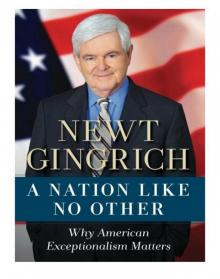 A Nation Like No Other
A Nation Like No Other To Try Men's Souls - George Washington 1
To Try Men's Souls - George Washington 1 Pearl Harbor: A Novel of December 8th
Pearl Harbor: A Novel of December 8th Valley Forge: George Washington and the Crucible of Victory
Valley Forge: George Washington and the Crucible of Victory To Save America
To Save America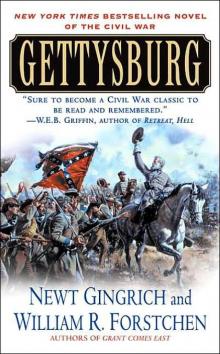 Grant Comes East cw-2
Grant Comes East cw-2 Victory at Yorktown: A Novel
Victory at Yorktown: A Novel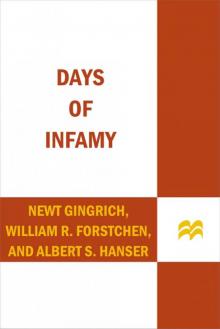 Days of Infamy
Days of Infamy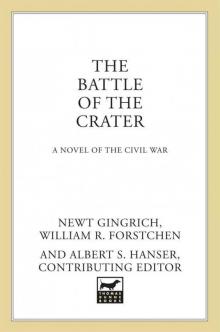 The Battle of the Crater: A Novel (George Washington Series)
The Battle of the Crater: A Novel (George Washington Series)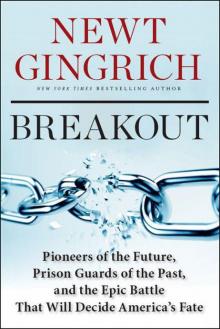 Breakout: Pioneers of the Future, Prison Guards of the Past, and the Epic Battle That Will Decide America's Fate
Breakout: Pioneers of the Future, Prison Guards of the Past, and the Epic Battle That Will Decide America's Fate Pearl Harbour and Days of Infamy
Pearl Harbour and Days of Infamy Pearl Harbour - A novel of December 8th
Pearl Harbour - A novel of December 8th Understanding Trump
Understanding Trump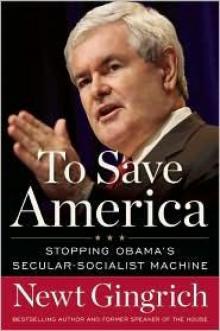 To Save America: Abolishing Obama's Socialist State and Restoring Our Unique American Way
To Save America: Abolishing Obama's Socialist State and Restoring Our Unique American Way